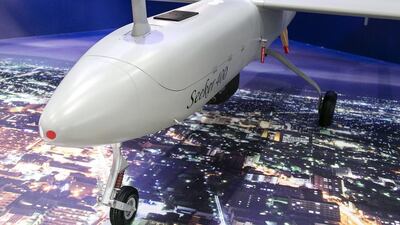In a break from the pattern of supplying raw materials and agriculture to the Middle East, South Africa is also pushing defence equipment, with some success.
The fact that the South African president Jacob Zuma was on Tuesday facing a secret vote of no confidence may affect relations with South Africa in the short term - should he lose - but the growing strength of ties between the Middle East and the nation should survive long term.
During the apartheid-era South Africa developed a sophisticated arms industry that pioneered various technology platforms now common within armies around the world today. During the 1980s it was one of the first to use GPS for artillery aiming, and drones for aerial surveillance. South Africa also developed a helmet-mounted site that allowed pilots to aim at targets just by looking at them - something the US is now employing in its next-generation F35 fighter jet.
Post-apartheid though, South African weapons makers have struggled to make the most of their technology. An attempt to sell long-range artillery to India ended ignominiously in 2005 after the state owned Denel arms manufacturer was accused of paying kickbacks for access to Indian officials. The matter was eventually resolved only in 2014 before Denel was allowed to do business with Delhi once again.
Likewise, attempts to sell the Rooivalk attack helicopter to Turkey in the mid-2000s also came to nothing, in spite of Denel spending millions of dollars on promoting its product.
More successful was the marketing of mine-resistant ambush protected (Mrap) vehicles to coalition forces in Afghanistan and Iraq. Also a technology largely pioneered by South Africa, Mraps help to protect against small arms fire and hidden devices such as roadside bombs, by deflecting the blast away from the crew compartment.
More recently though it is the Middle East itself that has shown interest in South Africa's defence sector. Denel has sold variants of its Mrap designs to the UAE, and also licensed production of a six-wheeled model to Nimr Automotive in Abu Dhabi, which itself is a world leader in the production of military, armoured and attack vehicles.
_______________
Read more:
Abu Dhabi military contracts boost profits for South Africa’s Denel
WATCH: Abu Dhabi's NIMR launches its latest military vehicle
_______________
"The Middle East has rescued Denel," says Ebrahim Deen, a researcher at Johannesburg based Afro Middle East Center. "The business flowing from the region has kept the company going."
The Middle East market has grown to such an extent that Denel now regards the Idex exposition held in Abu Dhabi as one of the most important events on its calendar. UMEX is another Abu Dhabi show it regularly attends, where last year it showed of its drones among other hardware.
Denel is also making inroads in Saudi Arabia. Last year the Rheinmetall Denel Munition plant opened in in Al Kharj south of Riyadh. The facility can produce mortar rounds, artillery shells and aircraft bombs.
Artillery is also an area where Denel previously excelled. It fielded the first "base bleed" projectiles that discharge gas after firing, reducing drag and sending the shell to targets more than 50km away.
However, if the firm is to continue to succeed in the Arabian Gulf region it will have to avoid the blunders of previous offshore ventures. Earlier this year, the Afrikaans weekly Rapport broke news that South Africa had applied to the UN for permission to sell 1.5 billion rand (Dh412.3 million) worth of arms to Iran. This was to accommodate a possible sale of the Umkhonto (Spear) surface-to-air missile, typically used to target other missiles, aircraft and ships.
This is unlikely to play well with GCC partners whose relationship with Teheran remains uneasy at best. Denel has since gone quiet about the possible Iran missile sale.
Meanwhile, the company is hoping to sell another of its missiles – the Ingwe anti-tank – to Saudi Arabia. The system is already taken up by Algeria and Iraq and Denel is in talks now to make it available to Riyadh as well.

